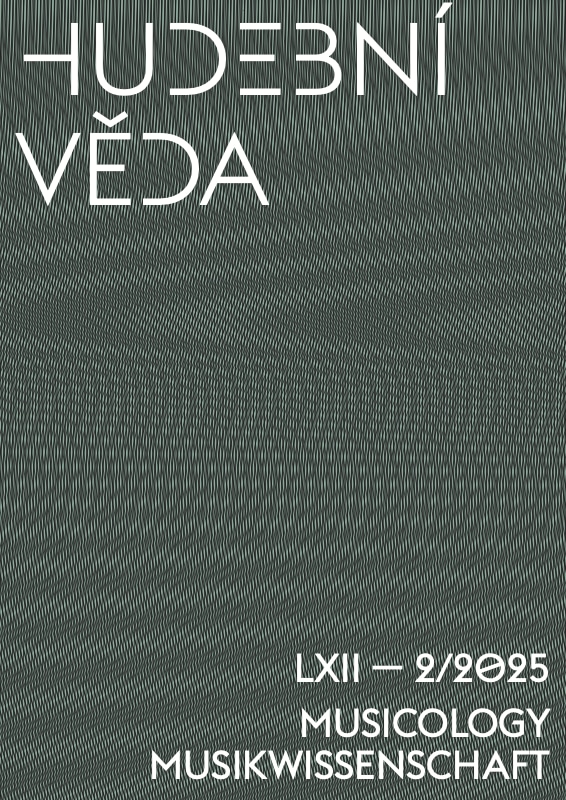Článek | Article
Autor:
Eliška Baťová
Název:
"Lift Thy Voice": Musical Aspects of Jan Augusta's Work at Křivoklát Castle
Variantní název:
„Vyšším hlasem zpívej": Hudební aspekty Augustovy tvorby na Křivoklátě
Zdrojový dokument:
Hudební věda LXII (2025), č. 2, s. 118–132.
DOI:
https://doi.org/10.54759/MUSICOLOGY-2025-0201
Trvalý odkaz:
https://kramerius.lib.cas.cz/uuid/uuid:72f118f2-c670-4ef3-a3c3-c5f39f96c3b5
English summary:
Within evaluations of the literary work of the bishop Jan Augusta (1500–1572) of the Unity of the Brethren, references to his extraordinarily prolific hymnwriting are very frequent. Research on manuscripts originating from the time of Augusta's imprisonment at Křivoklát Castle (1548–1564) and kept today in the Österreichische Nationalbibliothek in Vienna with the signatures 7452 and 7457 has enabled recognition of this work as more complex than previous studies had imagined.
An important element of the 1558 Register of hymns is the form prescribed by Augusta for Matins. This service was specifically intended as a space for realizing the Unity of Brethren's pericopal reforms. The singing of the invitatory using one of the traditional melodies at the service's opening is preserved in eighteen cases in total. A still more distinctive link to the secular Roman Rite is the preservation of two to three nocturns containing three lessons and the final singing of a hymn or song in place of a responsory. Meanwhile, the liturgy for services "during the day" is more closely tied to the Brethren's tradition: of the chants for the Ordinary of the Mass, only Czech tropes of the Kyrie and Sanctus are kept.
The 1562 manuscript of Hymns is a summary of the bishop's entire hymnographic work in prison. The majority of the melodies used come from the cantional of Jan Roh and also from contemporary Utraquist repertoire that Augusta knew by heart thanks to his experience of liturgy and carolling as a student. It contains eleven notated chants corresponding to the tradition of Utraquist Latin antiphoners and graduales. Twelve texts are written with German melodies taken from the polyphonic repertoire and from the earliest Lutheran hymn prints. The use of polyphonic musical models, together with expressive poetic rendering of the psalms, brings a new stylistic layer to the repertoire of Czech spiritual song.
České resumé:
Jedním z nejčastějších hodnocení činnosti bratrského biskupa Jana Augusty (1500–1572) je poukaz na jeho mimořádně plodnou písňovou tvorbu. V rámci výzkumu rukopisů, které vznikly v době Augustova věznění na Křivoklátě (1548–1564) a dnes jsou uložené v Österreichische Nationalbibliothek ve Vídni pod signaturami 7452 a 7457, se však podařilo tuto tvorbu vykreslit jako ještě komplexnější dílo, než dosavadní výzkum předpokládal.
Důležitým prvkem Registra piesní z roku 1558 je Augustou předepsaná forma matutina (jitřní pobožnosti). Právě matutinum mělo být prostorem pro realizaci reformy bratrského perikopálního pořádku. V celkem 18 případech je v úvodu bohoslužby podrženo invitatorium zpívané na jeden z tradičních nápěvů. Ještě výraznější vazbou na sekulární římský ritus je zachování dvou až tří nokturn, která zahrnují tři lekce a závěrečný zpěv hymnu nebo písně místo responsoria. Liturgie pro shromáždění „ve dne" je naopak více vázána na bratrskou tradici: ze zpěvů ordinária jsou zachovány pouze české tropované Kyrie a Sanctus. Proprium je nahrazeno písněmi, zachována je jen česká sekvence, která tím nabývá zvláštního postavení a pravidelně tvoří spolu s Kyrie vstupní část liturgie.
Rukopis Písní z roku 1562 je shrnutím celé biskupovy hymnografické tvorby ve vězení. Nápěvné odkazy čerpají v naprosté většině z Rohova kancionálu a dále také z dobového utrakvistického repertoáru, který znal Augusta zpaměti díky svým žákovským liturgickým a koledním zkušenostem. Je zde celkem 11 notovaných chorálních zpěvů, jejichž hudební zápis odpovídá tradici utrakvistických latinských antifonářů a graduálů. Dvanáct textů je psáno na německé nápěvy převzaté z polyfonního repertoáru a z nejstarších luterských písňových tisků. Využití polyfonních hudebních předloh spojených s expresivním přebásněním žalmů vnáší do repertoáru české duchovní písně novou stylovou vrstvu.
Keywords:
hymnology; Unity of the Brethren; music of the Bohemian Reformation; cantional; sacred song; Jan Augusta
Klíčová slova:
hymnologie; Jednota bratrská; hudba české reformace; duchovní píseň; kancionál; Jan Augusta

